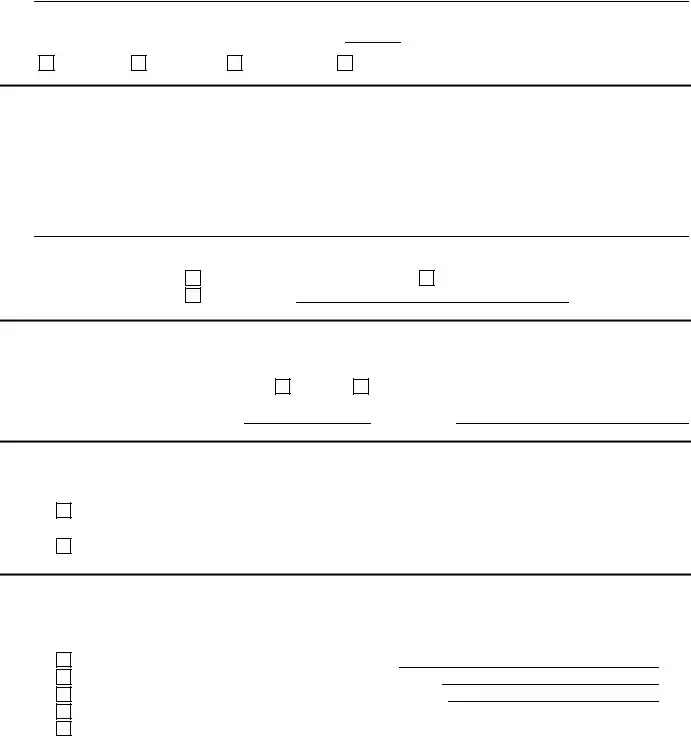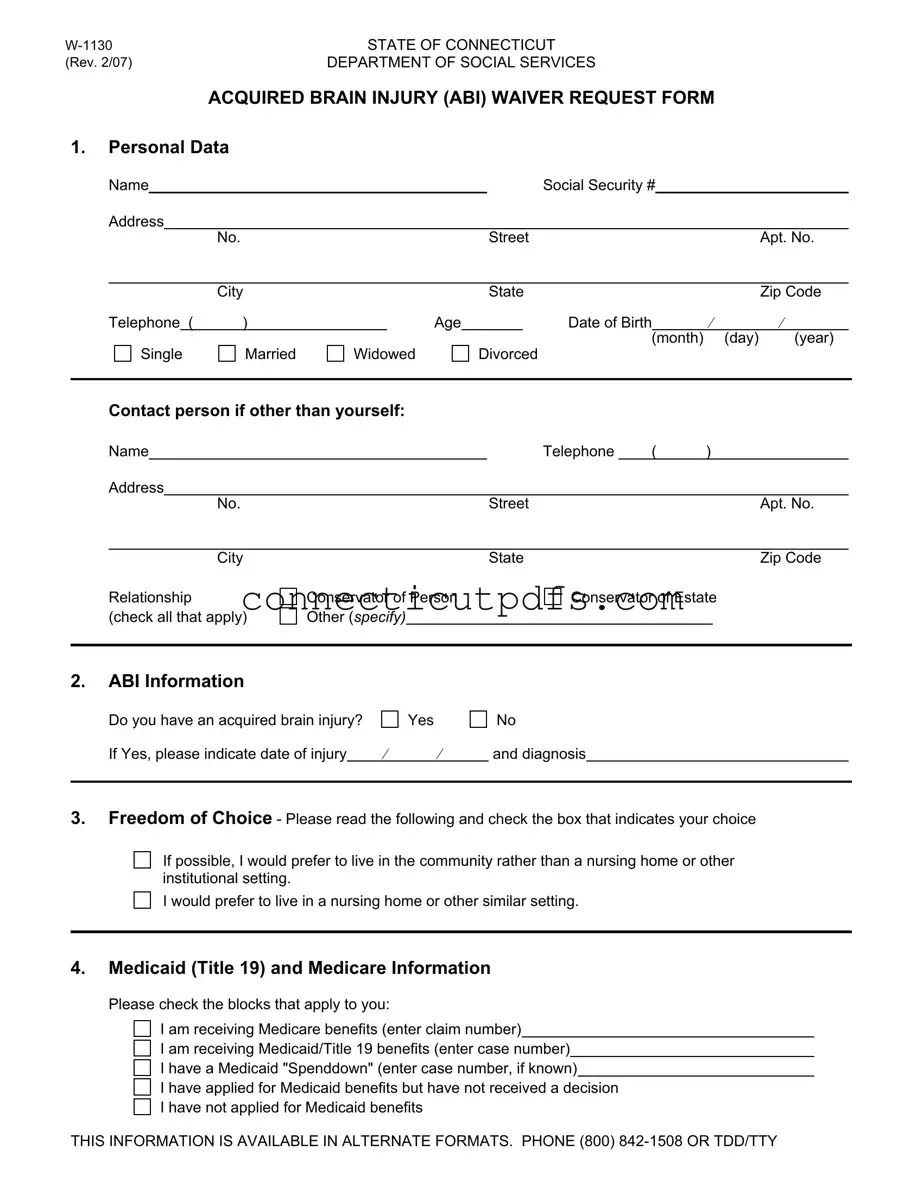Fill Your Connecticut W 1130 Form
The Connecticut W 1130 form serves as a crucial tool for individuals with acquired brain injuries (ABI) seeking assistance through the state’s ABI Waiver program. This form is designed to collect essential personal information from applicants, including details such as their name, address, date of birth, and marital status. Additionally, it requires information about the applicant's ABI, including the date of injury and diagnosis, which helps determine eligibility for support services. The form also emphasizes the importance of choice by allowing individuals to express their preference for living arrangements—whether in the community or in a nursing home setting. Furthermore, it gathers information regarding Medicare and Medicaid benefits, which are vital for assessing financial eligibility. Applicants must provide a comprehensive overview of their monthly income and assets, ensuring that all financial aspects are considered. By completing the W 1130 form, individuals take a significant step toward accessing necessary resources that can enhance their quality of life and promote independence.
Documents used along the form
The Connecticut W-1130 form is essential for individuals seeking assistance under the Acquired Brain Injury (ABI) Waiver program. It collects personal, financial, and medical information necessary for eligibility determination. Along with the W-1130 form, several other documents may be required to support the application process. Below is a list of these forms and documents.
- Medicaid Application Form: This form is used to apply for Medicaid benefits. It requires detailed financial information and may include documentation of income and assets.
- Power of Attorney Form: This document allows you to appoint someone to make decisions on your behalf when you are unable to do so. For more information, visit Texas Documents.
- Social Security Administration (SSA) Benefits Verification Letter: This letter confirms the amount of Social Security benefits an individual receives. It is often necessary to demonstrate income eligibility.
- Medical Records: These documents provide evidence of the acquired brain injury diagnosis and treatment history. They are critical for establishing eligibility for the ABI Waiver.
- Financial Disclosure Form: This form details the applicant's financial situation, including monthly income and total assets. It helps assess the financial eligibility for the waiver.
- Consent to Release Information Form: This document allows the Department of Social Services to obtain necessary information from other agencies or healthcare providers. It is vital for a thorough evaluation of the application.
- Personal Support Plan (PSP): This plan outlines the individual's needs and preferences for care and support services. It helps ensure that the services provided align with the applicant's goals.
Having these documents ready can streamline the application process for the ABI Waiver. Each document plays a significant role in ensuring that applicants receive the support they need. Proper preparation can lead to a smoother experience when navigating the complexities of the system.
Preview - Connecticut W 1130 Form

STATE OF CONNECTICUT |
|
(Rev. 2/07) |
DEPARTMENT OF SOCIAL SERVICES |
|
ACQUIRED BRAIN INJURY (ABI) WAIVER REQUEST FORM |
1.Personal Data
Name |
|
|
Social Security # |
|
|
Address |
|
|
|
||
|
|
No. |
Street |
|
Apt. No. |
|
|
City |
|
|
Telephone ( |
) |
|
Age |
|
|
|
|
|
|
Single |
Married |
Widowed |
||
State |
|
Zip Code |
|
Date of Birth |
|
⁄ |
⁄ |
(month) |
(day) |
(year) |
|
Divorced |
|
|
|
Contact person if other than yourself:
Name |
|
Telephone |
( |
) |
|
Address |
|
|
|
||
|
|
No. |
Street |
|
Apt. No. |
City
Relationship
(check all that apply)
State
Conservator of Person
Other (specify)
Zip Code
Conservator of Estate
2.ABI Information
Do you have an acquired brain injury?
If Yes, please indicate date of injury |
⁄ |
Yes
⁄
No
and diagnosis
3.Freedom of Choice - Please read the following and check the box that indicates your choice
If possible, I would prefer to live in the community rather than a nursing home or other institutional setting.
I would prefer to live in a nursing home or other similar setting.
4.Medicaid (Title 19) and Medicare Information
Please check the blocks that apply to you:
I am receiving Medicare benefits (enter claim number)
I am receiving Medicaid/Title 19 benefits (enter case number)
I have a Medicaid "Spenddown" (enter case number, if known)
I have applied for Medicaid benefits but have not received a decision
I have not applied for Medicaid benefits
THIS INFORMATION IS AVAILABLE IN ALTERNATE FORMATS. PHONE (800)

(800)
5.Financial Data
My total monthly income (for example, Social Security, SSI, disability benefits, pension benefits, Workers Compensation, wages, contributions, income from interest or dividends, etc.) is:
Amount |
|
Source |
|
|
|
|
|
|
|
|
|
My total assets (for example, cash, bank accounts, IRAs, life insurance, annuities, stocks, bonds, motor vehicles, property, etc.)
|
Amount |
|
|
|
Source |
|
|
|
|
|
|
|
|
|
|
|
|
|
|
|
|
|
|
|
|
|
|
|
|
|
|
|
|
|
Signature of Applicant |
Date |
Signature of Conservator or Other Representative |
Date |
Typed or Printed Name of Conservator or Other Representative |
Date |
Return This Form To:
Department of Social Services
25 Sigourney Street
Hartford, CT
Attention: Social Work Services
10th Floor
Common Questions
What is the purpose of the Connecticut W 1130 form?
The Connecticut W 1130 form is a request form for the Acquired Brain Injury (ABI) Waiver. It is designed for individuals who have experienced an acquired brain injury and wish to apply for services that support living in the community rather than in institutional settings. The form collects essential personal, medical, and financial information necessary for the assessment of eligibility for the waiver program.
Who should complete the W 1130 form?
The form should be completed by individuals who have an acquired brain injury. If the individual is unable to complete the form themselves, a conservator or another representative may fill it out on their behalf. It is crucial that the person completing the form has accurate information regarding the individual’s medical history, financial status, and living preferences.
What information is required on the W 1130 form?
The form requires various types of information, including personal data such as name, address, and date of birth. Additionally, it asks for details about the acquired brain injury, including the date of injury and diagnosis. Financial data is also necessary, including monthly income and total assets. Lastly, the form includes sections regarding Medicaid and Medicare status, as well as the individual's preference for living arrangements.
How is the W 1130 form submitted?
Once the form is completed, it must be returned to the Department of Social Services at the specified address: 25 Sigourney Street, Hartford, CT 06106-5033, Attention: Social Work Services, 10th Floor. It is advisable to keep a copy of the completed form for personal records before submission.
What happens after submitting the W 1130 form?
After submission, the Department of Social Services will review the application to determine eligibility for the ABI Waiver. This process may involve additional assessments or requests for information. Applicants will be notified of the decision regarding their eligibility and any next steps that may be required.
Where can I find assistance if I have questions about the W 1130 form?
If you have questions or need assistance with the W 1130 form, you can contact the Department of Social Services directly at (800) 842-1508 or TDD/TTY at (800) 842-4524. They can provide information and support regarding the form and the ABI Waiver application process.
Common PDF Forms
Connecticut 7B - Providing false information on the form can lead to legal implications under state law.
In Texas, the importance of the Motorcycle Bill of Sale form cannot be overstated, as it not only provides a clear record of the transaction between buyers and sellers but is also essential for legal and registration requirements. To help facilitate this process, individuals can easily access and complete their Motorcycle Bill of Sale form by visiting https://billofsaleforvehicles.com/editable-texas-motorcycle-bill-of-sale/, ensuring that their sale is documented accurately and efficiently.
H13b Form Ct - Record any additional charges in the specific section of H 110.
Ct Title Application - The Au 463 form is periodically updated, so users should check for the latest revision before completing it.
Guide to Filling Out Connecticut W 1130
Completing the Connecticut W-1130 form is an essential step for individuals seeking assistance through the Acquired Brain Injury Waiver. This form collects personal, financial, and medical information necessary for your application. Follow these steps carefully to ensure that you fill out the form correctly.
- Personal Data: Begin by entering your full name, Social Security number, and address. Include your age, marital status, and date of birth. If applicable, provide the contact information for a representative, including their relationship to you.
- ABI Information: Indicate whether you have an acquired brain injury by checking "Yes" or "No." If you answer "Yes," specify the date of injury and provide a diagnosis.
- Freedom of Choice: Read the options regarding your living preference. Check the box that reflects your choice between living in the community or in a nursing home.
- Medicaid and Medicare Information: Check all boxes that apply to you. This includes whether you are receiving Medicare or Medicaid benefits, have a Medicaid "Spenddown," or have applied for Medicaid benefits.
- Financial Data: Provide details about your total monthly income and total assets. List the amounts and sources of each type of income and asset you have.
- Signatures: Ensure that you sign the form. If a conservator or representative is assisting you, they should also sign and provide their printed name and date.
- Submission: Once completed, return the form to the Department of Social Services at the specified address in Hartford, CT.
Dos and Don'ts
When filling out the Connecticut W-1130 form, it’s essential to follow certain guidelines to ensure accuracy and completeness. Here’s a list of things to do and avoid:
- Do provide complete personal information, including your name, address, and Social Security number.
- Do clearly indicate whether you have an acquired brain injury and provide the date and diagnosis if applicable.
- Do check the box that reflects your preference for living arrangements, whether in the community or a nursing home.
- Do include all relevant Medicaid and Medicare information, such as claim numbers and case numbers.
- Don’t leave any sections blank; incomplete forms may delay processing.
- Don’t provide false information; honesty is crucial for your application’s success.
- Don’t forget to sign and date the form, as this is necessary for validation.
- Don’t submit the form without reviewing it for errors or missing information.
